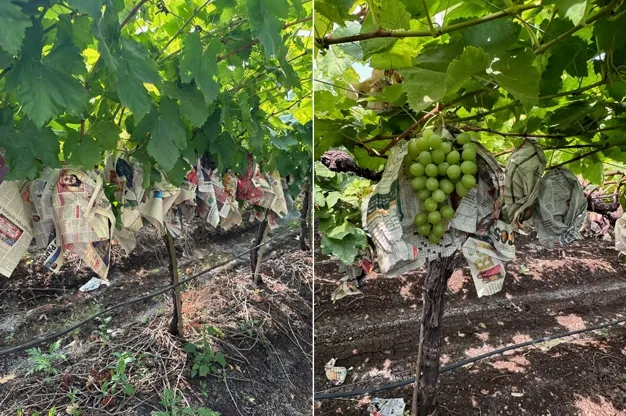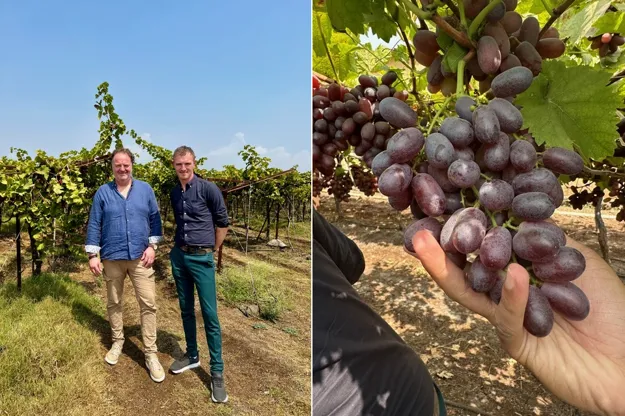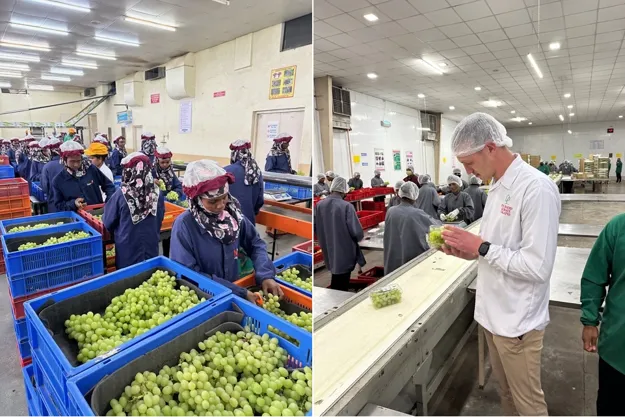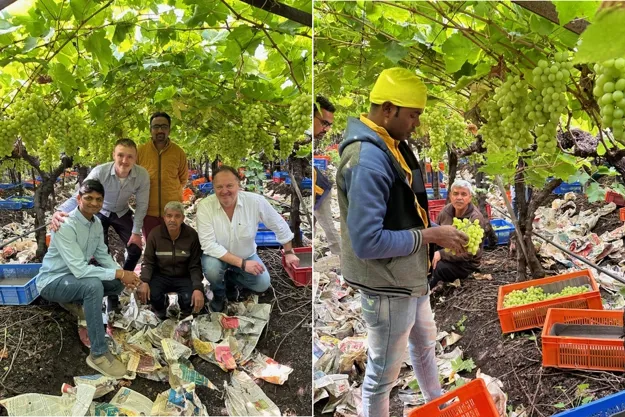For the first time since the pandemic, Luciën de Wit recently visited his Indian grape suppliers. His son Luuk, who is responsible for quality management at LuBa Fresh, joined him for the first time. Luciën is impressed by the quality improvements their Indian partners have made. "The country is truly catching up; there's been a significant investment in quality. You used to mainly see Thompson and Sonaka varieties; now there are increasingly new varieties, including Arra, being planted," he begins.
 Unique to the white, seedless Indian grapes is that they are wrapped in paper 35 days before harvest. "That's only done in India; in other countries, it's far too expensive. As a result, the grapes color evenly and don't suffer sunburn. A week before harvest, the paper is removed, and the color and brix level improve further."
Unique to the white, seedless Indian grapes is that they are wrapped in paper 35 days before harvest. "That's only done in India; in other countries, it's far too expensive. As a result, the grapes color evenly and don't suffer sunburn. A week before harvest, the paper is removed, and the color and brix level improve further."
"This year, the Indian grape season started early, with the first shipments in week 2. Those are already starting to decrease, so the peak is over. My last shipments should arrive in weeks 13-14. If they go by the current route around Africa, the last Indian grapes will arrive here around the first week of May," Luciën says. The route via the Cape of Good Hope adds ten days to the grapes' transit time, which has a significant impact. "Sea freight costs have doubled compared to the initial prices given for the season. That translates into an extra euro per box, just for that."

According to the Dutch importer, the grapes handle the longer transit time well. "The grapes undergo an extra quality check before departure; thus, an additional quality selection takes place in India. They're now underway for 35-40 days, but that's no different for South Africa with all its recent delays," says De Wit. The Red Sea issues, he adds, do not deter Indian exporters from shipping their grapes to Europe. "The portion of Indian grapes exported is just a fraction of the total cultivation. With 1.4 billion inhabitants, domestic consumption is enormous. The growers who focus on export are geared up for this."

"The grape market has been quite good all season. The grapes always arrive in an almost always empty market, prices are good, and sales are going well. Prices for Indian grapes are between €1.25 - €1.45 for the packaged product and €11 to €12.50 for the 4.5-kilo punnets," Luciën continues. "We naturally hope the Red Sea will become navigable again soon."
"Still, it opening now would only disrupt the market because many ships would arrive simultaneously then. The market could dip in weeks 11 to 13 due to a higher supply, but we'll definitely get fewer grapes from early April. When I was in India in week 9, significantly fewer grapes were being shipped than in the weeks before," Luciën concludes.

 For more information:
For more information:
Luciën de Wit
LuBa Fresh
Tel.: +31 (0) 777 777 715
Mob.: +31 (0) 641 273 443
[email protected]
www.LuBaFresh.com
